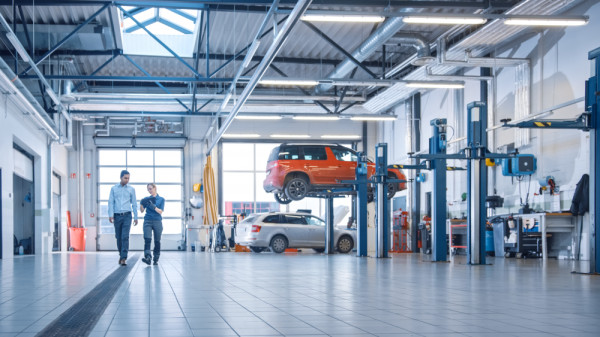Top Flooring Choices for Auto Mechanic Workshops - Durability, Safety, and Functionality

Auto mechanic workshops demand flooring that can withstand heavy-duty use, resist spills, and ensure the safety of the technicians working within. The ideal flooring should offer durability, easy maintenance, and a surface that minimises fatigue from prolonged standing. Several flooring options cater to these specific needs:
Epoxy Flooring:
- Durability: Epoxy flooring stands out for its exceptional durability, making it a stalwart choice for auto mechanic shops. It exhibits remarkable resilience against a multitude of stressors. It thrives in an environment where oil, grease, chemicals, and heavy impacts are commonplace. Its ability to withstand the abrasive nature of these elements ensures a longer lifespan compared to conventional flooring options.
- Safety: The seamless nature of epoxy flooring not only adds to its aesthetic appeal but also significantly reduces trip hazards in the workshop. Often enhanced with slip-resistant additives, this flooring ensures a secure footing for mechanics working in an environment prone to spills and slick surfaces. Such precautions drastically mitigate the risk of accidents, fostering a safer workspace.
- Ease of Maintenance: Simplifying the upkeep of the workshop, epoxy flooring boasts ease of cleaning and maintenance. Routine cleaning procedures involve simple sweeping and occasional mopping to maintain its pristine appearance.
- Periodic resealing, typically recommended every few years, acts as a shield against wear and tear, preserving the integrity of the floor surface. This minimal maintenance routine translates to less downtime and reduced maintenance costs for the workshop.
Rubber Flooring:
- Shock Absorption: Rubber flooring is a saviour for mechanics who spend prolonged hours on their feet. Its inherent cushioning properties serve as a buffer against the strains of standing on hard surfaces, significantly reducing fatigue.
- This shock-absorbing quality aids in minimising discomfort and potential musculoskeletal issues among workshop personnel, ensuring they remain productive and comfortable throughout their shifts.
- Chemical Resistance: Resistant to oil, grease, and various automotive fluids, rubber flooring maintains its structural integrity even when subjected to constant exposure. This resilience prevents deterioration, ensuring the flooring retains its quality and functionality despite frequent contact with potentially damaging substances.
- Sound Dampening: Beyond its practical attributes, rubber flooring acts as a barrier to excessive noise within the workshop. Its sound-absorbing capabilities help dampen the clangour of tools and machinery, creating a more conducive and less cacophonous work environment for mechanics.
Polyurethane Concrete Flooring:
- Strength and Resilience: Polyurethane concrete flooring presents itself as a robust option capable of enduring the rigours of a bustling auto mechanic workshop. Its exceptional strength allows it to withstand heavy equipment, dropped tools, and the constant movement of vehicles without succumbing to damage or wear.
- Chemical Resistance: Exhibiting high resistance to oil, grease, and a spectrum of chemicals, polyurethane concrete flooring maintains its structural integrity over time. Its chemical resilience makes it impervious to corrosion, ensuring longevity and ease of cleaning in an environment prone to spills and leaks.
- Slip-Resistance: One of its paramount features is its slip-resistant nature, even when exposed to fluids. This attribute significantly diminishes the risk of accidents caused by slippery surfaces, safeguarding the well-being of mechanics and staff working within the workshop.
Vinyl Composite Tile (VCT):
- Affordability: VCT offers an economical flooring option without compromising durability and resistance to fluids. Its cost-effectiveness makes it an attractive choice for auto mechanic workshops seeking a balance between budget considerations and quality flooring.
- Customisation: Available in various designs and colours, VCT allows for customisation to match the workshop's aesthetics. This versatility enables workshop owners to align the flooring with their branding or design preferences, enhancing the overall ambience of the workspace.
- Ease of Replacement: Featuring individual tiles that can be easily replaced if damaged, VCT minimises maintenance costs and downtime. This modular nature allows for targeted repairs without requiring an overhaul of the entire flooring, ensuring a more cost-efficient solution for upkeep.
Concrete Sealers:
- Cost-Effective: As a budget-friendly option applicable to existing concrete floors, concrete sealers provide a pragmatic solution for workshops aiming to upgrade without extensive renovation costs. They offer an affordable way to enhance the durability and longevity of the existing flooring.
- Chemical Resistance: The application of concrete sealers acts as a protective barrier against oil, grease, and chemicals, prolonging the life of the underlying concrete. This shield effectively mitigates potential damage caused by frequent exposure to automotive fluids, ensuring the structural integrity of the flooring.
- Low Maintenance: Paired with a non-slip additive, concrete sealers simplify maintenance efforts. Their easy-to-clean surface reduces the need for extensive upkeep, enabling mechanics to focus more on their tasks and less on maintaining the workshop's flooring.
Considerations for Selection:
- Durability: Prioritise flooring that can endure the heavy-duty demands of a mechanic workshop, including the weight of machinery, dropped tools, and potential chemical spills.
- Safety: Opt for flooring options equipped with non-slip features to mitigate the risk of accidents in a high-risk environment where spills are frequent.
- Maintenance: Choose flooring that requires minimal upkeep to reduce downtime for maintenance and ensure longevity, contributing to cost-effectiveness in the long run.
- Comfort: Select flooring materials that offer cushioning and ergonomic support to minimise fatigue for mechanics who spend extended hours standing, ultimately promoting a healthier and more productive workspace.
Conclusion:
Selecting suitable flooring for auto mechanic workshops involves considering durability, safety, maintenance, and comfort. Epoxy, rubber, polyurethane concrete, VCT, and concrete sealers are among the top choices due to their robustness, resistance to chemicals, and ease of maintenance.
Prioritising the right flooring not only ensures a safe environment but also enhances productivity and longevity, making it a worthwhile investment for any auto mechanic workshop.
